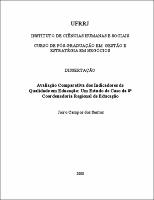Please use this identifier to cite or link to this item:
http://rima110.im.ufrrj.br:8080/jspui/handle/20.500.14407/15308| Tipo do documento: | Dissertação |
| Title: | Avaliação comparativa dos indicadores de qualidade em educação: um estudo de caso da 8ª coordenadoria regional de educação |
| Other Titles: | Comparative Evaluation of the Pointer s of Quality in Education: a Study of case of 8ª Education Regional Coor dinator |
| Authors: | Santos, Jairo Campos dos |
| Orientador(a): | Souza, Marcos Aguiar de |
| Primeiro membro da banca: | Souza Filho, Edson Alves de |
| Segundo membro da banca: | Monteiro, Rosa Cristina |
| Keywords: | Qualidade em Educação;Indicadores de Qualidade;Administração Pública;Quality in Education;Pointers of Quality;Public Administration |
| Área(s) do CNPq: | Ciências Humanas |
| Idioma: | por |
| Issue Date: | 13-Oct-2008 |
| Publisher: | Universidade Federal Rural do Rio de Janeiro |
| Sigla da instituição: | UFRRJ |
| Departamento: | Instituto de Ciências Humanas e Sociais |
| Programa: | Programa de Pós-Graduação em Gestão e Estratégia |
| Citation: | Santos, Jairo Campos dos. Avaliação comparativa dos indicadores de qualidade em educação: um estudo de caso da 8ª coordenadoria regional de educação. 2008. 80 f. Dissertação (Programa de Pós-Graduação em Gestão e Estratégia) - Universidade Federal Rural do Rio de Janeiro, Seropédica-RJ . |
| Abstract: | município do Rio de Janeiro, especificamente no contexto da 8ª Coordenadoria Regional de Educação, tendo como parâmetro, de um lado, a visão dos profissionais das escolas e, de outro, os indicadores obtidos a partir da avaliação do atingimento de metas previstas no Orçamento, da avaliação das Unidades Escolares/Creches (definidos pela Secretaria Municipal de Educação e realizados pelas Coordenadorias Regionais de Educação) e da avaliação do desempenho escolar dos alunos (definidos pela Secretaria Municipal de Educação). Além da pesquisa documental e bibliográfica, foi realizada uma pesquisa de campo através de instrumento testado e validado, para fins do presente estudo, denominado Indicadores de Qualidade das Escolas Públicas. Tal instrumento tornou possível agrupar o posicionamento dos profissionais das escolas em fatores, permitindo, assim, a comparação objetivada no estudo. Os dados evidenciaram diferenças significativas no posicionamento dos profissionais das escolas, quando em comparação com os indicadores oficiais de avaliação das políticas públicas adotadas para o setor dentro da região da cidade analisada. O estudo também apresentou resultados que fornecem elementos para subsidiar correções na forma de avaliação das políticas educacionais públicas existentes e, também, se potencializado, permite condições para uma investigação nas outras Coordenadorias Regionais de Educação da cidade. Em decorrência das diferenças observadas e as suas possíveis origens, há a possibilidade de considerar que um profissional especializado em gestão componha a direção da escola, ou seja, assim como existem em outras instituições de ensino, públicas inclusive, a divisão da gestão educacional em atividade meio e atividade fim poderia oferecer melhores condições para a busca da qualidade do processo e, no final, da própria educação. |
| Abstract: | The general objective of this work consists of comparing the quality of the educational management in the city of Rio De Janeiro, specifically in the context of 8th Education Regional Coordinator, having as parameter, of a side, the vision of the professionals of the schools and, of another one, the pointers gotten from the evaluation of the reaching of goals foreseen in the Budget, of the evaluation of the Pertaining to school Units/Daycare centers (defined for the City department of Education and carried through by the Education Regional Coordinator) and of the evaluation of the pertaining to school performance of the pupils (defined for the City department of Education). Beyond bibliographical the documentary research and, a research of field through tested and validated instrument was carried through, for ends of the present study, called Indicating of Quality of the Public Schools. Such instrument became possible to group the positioning of the professionals of the schools in factors, allowing, thus, the comparison objectified in the study. The data had evidenced significant differences in the positioning of the professionals of the schools, when in comparison with the official pointers of evaluation of the adopted public politics for the sector inside of the region of the analyzed city. The study also it presented resulted that they supply elements to subsidize corrections in the form of evaluation of existing public educational politics e, also, if in potential, allows conditions for an inquiry in the other Education Regional Coordinator of the city. In result of the observed differences and its possible origins, it has the possibility to consider that a professional specialized in management composes the direction of the school, that is, as well as exist in other institutions of education, public also, the division of the educational management in activity half e activity end could offer better conditions for the search of the quality of the process and, in the end, of the proper education |
| URI: | https://rima.ufrrj.br/jspui/handle/20.500.14407/15308 |
| Appears in Collections: | Mestrado Profissional em Gestão e Estratégia |
Se for cadastrado no RIMA, poderá receber informações por email.
Se ainda não tem uma conta, cadastre-se aqui!
Files in This Item:
| File | Description | Size | Format | |
|---|---|---|---|---|
| 2008 - Jairo Campos dos Santos.pdf | Jairo Campos dos Santos | 1.47 MB | Adobe PDF |  View/Open |
Items in DSpace are protected by copyright, with all rights reserved, unless otherwise indicated.

